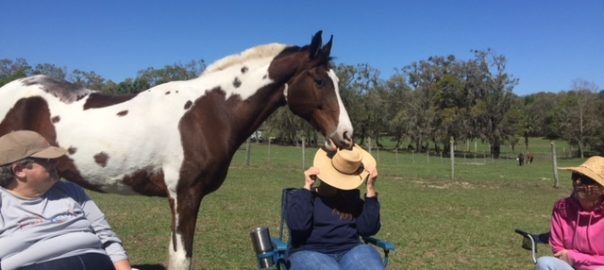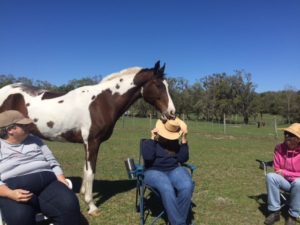In Buddhism there is the Tibetan word “Shenpa,” that can be translated “something that hooks us,” according to Buddhist teacher Pema Chodron. It is also “the urge.”
Shenpa is what drives habitual patterns, motives and addictions. It comes in two parts: the reaction to pain and the escaping of pain. And the reaction to an insult, or something you don’t like that someone has said or done.
While it can be easily seen in overeating, binge drinking and attachment to anger, it can also be seen in overdoing and attachment to good things, like meditation or doing good for the world.
As people, we want things to remain the same. We live in a changing world that fills us with insecurity. If we experience one wonderful experience, we want all experiences with that one person or animal to continue to be that wonderful.
This is where horses come in. Horses don’t come to us seeking for us to do trot circles or train them to become Grand Prix competitors. They would be perfectly happy with space, grass, shelter, water and friends. As long as they have these things, their needs are met. They don’t generally think the way we do in this way.
So, when we come in with an agenda, we override their natural flow. But what if we drop that agenda and just hang out for a while, as though we are visiting herd members, and see what happens?
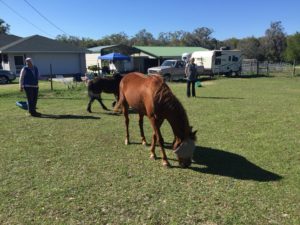 We worked with this concept in the Florida workshop this past weekend. A wide variety of equines made it possible to see how they interacted with people.
We worked with this concept in the Florida workshop this past weekend. A wide variety of equines made it possible to see how they interacted with people.
Cocoa the pony has been to the workshops before, and generally, he is a self-confident, proud pony who does his job pulling a cart very well. He doesn’t interact much with the people because he likes things the way they are. I noticed he was very good at doing what I asked, but that there wasn’t any engagement between us. Over the years of working with Cocoa, he has become more personable with his owner.
So, I stopped doing anything and I turned away from him. Within minutes he came over to me to visit and breathe with me.
Another time I was just walking behind him and I felt him moving far ahead of me, and sensed that he thought I was chasing him, even though I did not feel I was at all. It was his perception. I stopped again. Other people also had that experience with him. (The pony mare Amber demonstrated how to move Cocoa very effectively).
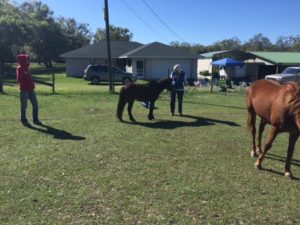 In Liberty Foundations, we want to be accepted by the herd but change our position in the herd organically. But sometimes our Shenpa gets in the way and we keep on asking, seeking a particular outcome.
In Liberty Foundations, we want to be accepted by the herd but change our position in the herd organically. But sometimes our Shenpa gets in the way and we keep on asking, seeking a particular outcome.
Another gelding, Jack, didn’t want to be separated from his mares who were in heat in the next pasture. There were other visiting geldings so he needed to ensure his herd was safe. So we worked around that, and actually he began to enjoy dancing and running with his owner Anne, even taking her cue to go into the beginnings of a Spanish walk, which he’d never done before. She was naturally very excited by this.
The next day Jack simply wouldn’t leave the fence, and got frustrated with anyone trying to engage with him. He had a few brief moments of going over cavaletti and engaging, but it was clear that he didn’t want to be with people. So we let him back in with his mares.
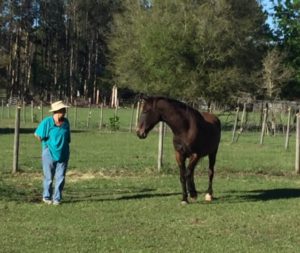 He was a different horse the second day. It was a big lesson for all of us – we had our hopes high, we had seen Jack’s performance the day before and wondered what he could achieve the second day. He was full of such animation and joy that day, and the next, nada. We were hooked.
He was a different horse the second day. It was a big lesson for all of us – we had our hopes high, we had seen Jack’s performance the day before and wondered what he could achieve the second day. He was full of such animation and joy that day, and the next, nada. We were hooked.
It was as Pema Chodron said, we want all experiences with that one person or animal to continue to be that wonderful.
We are attached. At that point it was important to check our personal energy and drop it. I noticed when I worked with Jack that when I dropped my energy and with it, my desire to move him, have him begin elevating his feet in that dancy step, he could give more attention to me. If I offered him something, companionship at the gate, a tuft of hay, he had more interest. His attention was divided at best, because of the mares, but there was a glimpse of attention to me.
While the work is simple, we also encountered the edge of the horse’s tolerance. I like to stop working before we come to that, but sometimes the horse gets there first. Prince was excellent at working with numerous people and softening in his demeanor, coming away from food and into relationship. He wanted private time in the form of frequent pauses, and he feared being crowded. We could see that when our own urge to have him do more got in the way, he didn’t want to participate further. Shenpa.
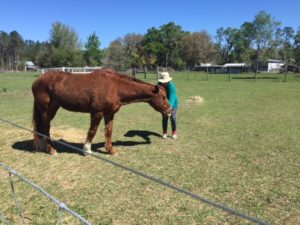 Cherokee is an older mare I have always felt was angry. She had a hard life before Anne took her in, and has also suffered a lot in her body. With a horse with this kind of anger, you want to stay clear of what she is carrying. Drop your energy into your feet, keep it light. She has her own Shenpa, a negative expectation. At the same time, she wants human attention.
Cherokee is an older mare I have always felt was angry. She had a hard life before Anne took her in, and has also suffered a lot in her body. With a horse with this kind of anger, you want to stay clear of what she is carrying. Drop your energy into your feet, keep it light. She has her own Shenpa, a negative expectation. At the same time, she wants human attention.
We chose an exercise that would engage her and please her at the same time. She became light and curious in her being, and the anger she arrived with dissipated.
It has taken awhile for Penny to come around to separating from her herd, but last year she made some big strides. This year, she was in heat and wasn’t happy leaving her herd. She could work well with her owner Gabi, and did quiet down with others also. When she engages, she is very soft and willing, but when she gets anxious, sometimes she doesn’t know you’re there.
We worked with separating horses who spend all their days together and reuniting them. We worked in short segments, extending their attention span, and coming up against a wall of resistance in others.
Not only do we have a different horse on a different day, we are also different. On some days, the horses graze close to one another, on other days they are far apart. The heart of the horse beats with the rhythm of the herd, a group heartbeat. Our challenge is to get our hearts to beat with it, dropping expectations, reshaping what we want from the horse. If we become a valid herd member, then the horse will be able to separate out from the herd more easily, and attention to us will increase.
(c) Susan Smith, Horses at Liberty Foundation Training, Equine Body Balance (TM)
See my
Events for information on upcoming clinics and workshops. 2018 calendar is developing! Workshops scheduled for Santa Fe,Wisconsin, Colorado, Oregon and Maryland!



